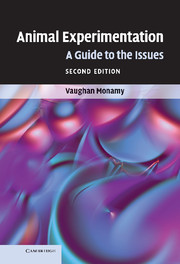Book contents
- Frontmatter
- Contents
- Preface to the second edition
- Acknowledgements
- 1 Issues in animal experimentation
- 2 A history of animal experimentation
- 3 Opposition to animal experimentation
- 4 The moral status of animals
- 5 Animal use
- 6 The regulation of experiments
- 7 Seeking alternatives
- 8 Conclusions
- Ethical guidelines for students in laboratory classes involving the use of animals or animal tissues
- References
- Index
1 - Issues in animal experimentation
Published online by Cambridge University Press: 05 June 2012
- Frontmatter
- Contents
- Preface to the second edition
- Acknowledgements
- 1 Issues in animal experimentation
- 2 A history of animal experimentation
- 3 Opposition to animal experimentation
- 4 The moral status of animals
- 5 Animal use
- 6 The regulation of experiments
- 7 Seeking alternatives
- 8 Conclusions
- Ethical guidelines for students in laboratory classes involving the use of animals or animal tissues
- References
- Index
Summary
Looking back at the first half of my life as a zoologist I am particularly impressed by one fact: none of my teachers, lecturers, or professors with whom I came into contact … none of the directors of laboratories where I worked, and none of my co-workers ever discussed with me, or each other in my presence, the ethics of zoology. No one ever suggested that one should respect the lives of animals in the laboratory or that they, and not the experiments, however fascinating and instructive, were worthy of greater consideration.
Miriam Rothschild (1986, p. 50)AIMS
The purpose of this book is to introduce life science students to the major issues that constitute modern debate about animal experimentation. Many such students will complete tertiary studies and go on to become the new generation of scientists. Those in the medical and allied health professions may only be exposed to animal experimentation in their undergraduate years. Others, such as geneticists, molecular biologists, veterinarians, physiologists, zoologists and agricultural scientists, may be actively involved in animal research at a postgraduate level and beyond. The welfare of animals in their care will continue to be of major concern to their employers, the granting bodies that fund their scientific research, and to the public at large.
- Type
- Chapter
- Information
- Animal ExperimentationA Guide to the Issues, pp. 1 - 7Publisher: Cambridge University PressPrint publication year: 2009



